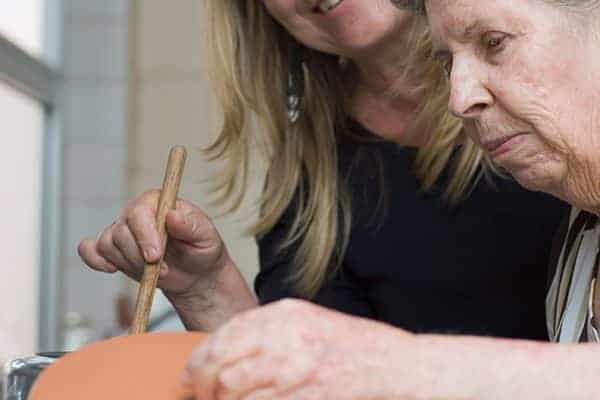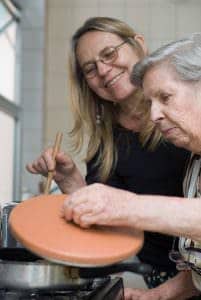Read about respite care and what it means, how to arrange it and how it might be able to help you and your family.
By 2066, 25% of the UK population will be aged 65 or over, with five million over 85’s as part of that figure. The population is ageing, which is leaving numerous issues across the country, largely related to the care system here.
The UK care system is currently struggling to provide all the care for those in need, and seems unlikely to be able to handle the expected increase in those requiring care in the future unless fundamental changes are made.
We’ve all heard of bed blocking problems within the NHS and residential homes that are full, even if most people don’t wish to move into a care home there may actually be no places available anyway.
This article is intended to assist people’s understanding of the benefits of respite care and how it works; but is not a substitute for advice from a healthcare professional.
Family Care-Givers
Family caregivers have always been and still are an important part of the system of care provided in the UK. They provide unpaid care to elderly loved ones in their own homes. This kind of care enables elderly family members to stay safe and as independent as possible, surrounded by the people they love, in a place familiar to them.
Although family caregiving is often a good care solution for many families, it does still have its problems. One of the main problems is that the time and energy required to provide care can lead to exhaustion – commonly known as caregiver burnout.
This is where the person providing the care has ignored their own needs for so long, and endured all of the emotional and physical strain of caregiving without support for so long, they simply burnout and break down. This kind of burnout can take months, or even years to recover from and is clearly best avoided for the good of everyone’s health and well-being.
There are many ways to avoid caregiver burnout, such as getting support for the emotional side of caregiving and sharing some duties with other family members if you can. Caregivers can find it hard to put themselves first because they think it takes some level of care away from the person they are caring for. Yet, caring for yourself first ultimately helps you and your loved one, because you are happier, healthier and able to be the best carer you can be to your family member.
Caregivers can also access vital help and relief from their challenging duties in the form of respite care.

What Is Respite Care?
Respite care is where the family caregiver providing care is able to take a break from caring whilst a qualified carer takes over from their duties. Respite care can be specialist, or simple companion care and can last as little or as long as it is required.
Carers may require respite care because they need a regular arrangement where they can tend to other commitments or interests. A couple of weeks break might be needed for a holiday or to recuperate health levels or perhaps some time is needed for an emotional break. The position of being a carer can be draining and challenging, and caregivers can require respite care for a wide variety of reasons.
The person who receives care also benefits from respite care. They are able to meet somebody new, and sometimes lots of new people in the case of respite day care. They may also need care from a person who has specialist experience and training that their family caregiver does not have.
Respite care may be needed in the case of a medical occurrence like a stroke, or a major operation like knee replacement surgery, where specialist support is required for recovery. Sometimes respite care is also used as preparation for permanent residential or nursing home care.
Respite care is incredibly flexible and can sometimes be provided within 24 hours from a private company. It is care on demand and there are many benefits to both the family caregiver and the person receiving care.

The Different Types Of Respite Care
To ensure the maximum flexibility and convenience for clients, there are a wide range of respite care types available. Every person is unique in their reasons for needing respite care, and in their circumstances and what kind of respite care they need.
Here are some of the main types of respite care currently available in the UK:
Respite Daycare
Respite daycare is a social, active, immersive type of care where elderly people are able to go to a specific place of care where they will meet people of a similar age, complete activities and enjoy other highlights like singing, exercise classes and hobby classes.
Some daycare attendees visit at least once a week, which gives family caregivers plenty of time to rest, focus on other needs and generally get a break from their role.
Daycare can provide facilities similar to a residential care home such as personal care and meals etc. It could also be specialist daycare and be very specific in the type of care it offers, such as rehabilitation after a major operation or medical incident. Daycare may be privately run, or it could be run by a charity or local council.
At-Home Respite Care
Respite care may be provided to you in the home where you care for your loved one. This type of care is incredibly flexible and can be tailored exactly to the needs and wishes of the elderly person.
Care can be daily, once a week, once a fortnight or for a block period of time like two weeks whilst the family care-giver goes on holiday. Carers can stay for any period of time and may even be able to stay overnight if your relative needs 24/7 support.
There are services that relate more to companionship and guardianship and others that are more specialised in terms of rehabilitation or nursing care. Care in the evening only is also available, as is full live-in care.
Complete live-in care is where a person lives in the property with the person needing care and provides a care package to them, completely tailored to their needs. There are also terminal illness care services available in the home.
Respite Holidays
A respite holiday can mean a few different things. It can be where you get a break from caring whilst your loved one is cared for at a special centre which can be beneficial to both parties.
It can be where you take a holiday with your elderly loved one so that you both get the chance to experience something new, and a change of scenery. Sometimes this kind of holiday can be undertaken with a live-in carer who may accompany you on the holiday. They then provide care to your loved one so that you can simply enjoy spending time with them, and get some time to yourself too.
These kinds of things can be difficult to arrange but alleviate the guilt some caregivers have of going on holiday without their loved one.
Respite Based Within A Nursing Home/ Residential Care Home
Nearly all nursing homes and residential homes tend to provide care long-term for their clients. However, some do also offer respite care services that can be booked in advance. The best way to find out about these services is by searching online for local residential homes and getting in touch. By reaching out, they may have services on offer, or they may be able to let you know about other local places that offer those services. Social services, related charities and your GP may also have information about the kinds of places offering respite care near you.
Respite Care From Loved Ones
In many family caregiver scenarios, the caregiver takes all the responsibility on their shoulders for their caregiving responsibilities. In some instances it may be that help and support is available within their immediate family and friend circles, they just had not considered it before. Perhaps friends and family hadn’t wanted to interfere, but would be more than willing to offer respite care to you for a set amount of time. Perhaps for an afternoon a week, maybe even for a week or two if they feel confident in the support they can offer. Respite support from family and friends can benefit you and your elderly relative, and the person providing the respite support as they help you and they get to know your loved one better.

The Importance of Respite Care
Respite care is not just beneficial to both the person requiring care and the family caregiver, it is essential.
The Importance Of Respite Care For Carers
Caring is an incredible gift to your loved one, enabling them to stay with the people they love, in a place they feel comfortable and valued. However, it can be so consuming for some that it takes over their life, and a person can feel their only value is being a carer, and they lose a sense of value in their own right.
Caring for somebody full time can take up so much physically and emotionally, and some caregivers may also have to deal with the demands of a career, a partner, children and their home life.
Respite care is important to enable family caregivers to deal with tasks that are difficult to complete whilst caring. It also enables the person to do things they enjoy doing ‘just because’ or just for themselves. It enables them to spend time by themselves, something many caregivers neglect to do, which ultimately results in them being emotionally and physically drained.
Carers will be better able to care if they feel strong and healthy in themselves, benefitting both themselves and their loved one.
The Importance Of Respite Care For The Person Needing Care
On the most basic level, the person needing care wants their carer to be happy, healthy and wants the best for their family member. In addition, they benefit from the person caring for them being as healthy and happy as possible, because it means they get the best possible care.
Respite also helps both parties to get a bit of a break, and a bit of time apart, which no matter how much two people love each other, is important. The person being cared for is also likely to benefit from the company of another person, and in the case of daycare, from being around other people of a similar age and interests.
They will also benefit from activities, events and hobbies put on by the daycare team. At the very least, they will also benefit from being in a different environment, such as the daycare centre, a relative’s house or in a holiday environment.
Planning Respite Care
Although emergency care is often available to those who need it, planning ahead is really important and beneficial in most cases. This is particularly true if you are new to care and don’t know local contacts or processes.
It is really important to talk to your local authority if you believe the respite care could be funded by them, or talk to a local respite care provider if you expect to be paying for the care privately. You will need to detail the care needs of your loved one to ensure the right respite care is provided, and involve them in the discussions if appropriate.
The process should in no way be distressing and care providers are very sensitive to the different emotions both you and your loved one will be experiencing if this is the first time of using respite care. You should, however, explain in detail how and when you currently provide care so the respite care will be a success.

Finding Out About Respite Care Before You Need It
It is a really good idea to look into respite care before you actually need it. It helps you connect to any local services you may need quickly, and it ensures you know what is on offer in the case that you do want to plan something in advance, like a holiday. Here are some of the best sources of information for care available in your area:
- Your GP
- Local council / social services
- Family and friends
- https://www.carechoices.co.uk/publication-type/regional-care-services-directories/
Setting Up Emergency Care
It is important to have emergency care setup in the event you are unable to provide care for your loved one. If you have an accident, get ill, need to support family members or friends or even need to be at work unexpectedly, you should have care arrangements made for your loved one.
A friend or a relative might offer to be available at certain times, and even a neighbour could help in some instances. Rather than giving keys out, consider a door code for your front door that you can share the code to the person going to provide care in an emergency. A basic care guide easily visible in your home could also be a really handy emergency resource.
Respite Care Funding
Respite care can be free, but, sometimes free services may not be what you want, or what is needed. Sometimes a family wants to privately fund to obtain the bespoke care they want, and sometimes a family requires care to be funded by their local authority. In all instances, even if the money is readily available for private funding, it is important to know your options so that all eventualities and choices are considered.
Funding From Your Local Authority
You will not receive any funding for care unless you have had a carer’s assessment and your loved one has had a care assessment. The assessments are free and ensure you are fairly judged on your need for funding and access to services. Following these assessments care may be provided completely funded, or it may be partially funded. A financial test ensures that the situation is judged properly and fairly and is applied differently if you provide your loved one care at home.
Respite Care Funding From A Charity
Some charities offer funding help for respite care or they actually run daycare or events themselves that you can apply for. You can find out more about support with respite care funding from charities here.
Paying For Respite Care Yourself
If you cannot find other funding or you prefer to privately fund then it is important to properly plan financially, ideally with the services of an experienced Independent Financial Advisor. Money may come from the person receiving care (if they are of sound mind to provide permission or if you are a proper guardian of their estate), from your own pension funds, salary, investments, savings or other sources.
It is important to carefully plan the financial side of respite care properly, ideally with the loved one you care for. This will protect your financial status and ensure that you have plans in place should the private funding run out. In some instances you may need to fall beneath a certain financial threshold in order to benefit from funding help, so you may only need to partially plan private funding until savings run out and you can apply for funding aid.
Remember: Ask for help sooner rather than later to avoid crisis situations developing.
Other Ways Carers Can Support Their Own Health & Well-Being
Respite care is an amazing resource all family caregivers should utilise regardless of how well they feel and if you do need to get certain things done, or if you simply want to go on one holiday a year, you will need respite care at some point.
At the very least having respite care setup in the case of an emergency is a very practical and important thing to do. It is also a really good idea to work on supporting yourself in addition to any respite care, to ensure that you stay as healthy and happy as possible in your role.
You deserve help too, you deserve to have your own good health just like everybody else so do draw on every possible resource to ensure you are the healthiest and happiest you can be. Here are some suggestions to help you maintain balance in your caregiving role:
- Utilise support and information available to you from organisations such as https://www.carersuk.org/
- Invest in your own personal hobbies and interests, even if you can only do so once a month
- Stay as physically fit as possible
- Focus on your mental health, taking breaks when you need to, and investing in important services like counselling if you need them
- Don’t be afraid to have a coffee with a friend and talk about yourself whether that is to have a bit of a moan, or to talk about the you that is not a carer, because that is not all that you are
- Recognise that you are a person deserving of respect, health and love in your own right
- Consider mindfulness practise day to day, there are lots of free apps and videos available
Respite care, in addition to a good level of self care, make up the important parts of avoiding caregiver burnout and ensuring everyone involved is as healthy and happy as possible. It does take a team effort, but simply recognising that you do not have to do this alone, is often the first step for a caregiver. You’re doing an amazing job, and in order to continue to do so, you need support, and you deserve it. Learn about respite care today to ensure that you have care support setup for a time when you need it. Preparation is key, and the peace of mind you’ll have from knowing the support is there if you need it, is priceless.





